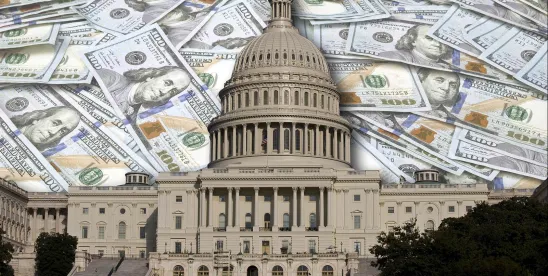When presidential administrations change, it’s common to see significant shifts in policy via new regulations, executive orders, different interpretations of federal laws, and changes to enforcement priorities, budgeting, and staffing of federal agencies. What changes can employers expect to see in employment law in the next few years if Vice President Kamala Harris wins the presidential election in November? And what shifts are expected if former president Donald Trump wins? It’s possible to draw some predictions from the two candidates’ campaign promises and governing histories.
Quick Hits
- Vice President Kamala Harris and Donald Trump have voiced differing approaches toward the economy and organized labor during their campaigns.
- Employers can expect federal laws and regulations to shift based on this year’s election results.
- Minimum wage, paid leave mandates, and tax rates could change based on who wins the election.
Minimum Wage and Overtime
Harris has supported increasing the federal minimum wage. In a 2020 debate, Trump said hiking the minimum wage would hurt businesses.
“If Harris is elected, she plans to prioritize raising the federal minimum wage to at least $15 per hour and establishing a national paid leave program. We can also expect ongoing defense of regulations implemented by the U.S. Department of Labor (DOL) during the Biden presidency,” said Keith Kopplin, a shareholder in Ogletree Deakins’ Milwaukee office and co-chair of the firm’s Wage and Hour Practice Group.
During the Trump administration, the DOL issued a rule that raised the salary threshold for overtime exemptions, but not nearly as far as the Obama administration had sought.
“If Trump is elected, we will likely see a rollback of current regulations and perhaps reinstatement of the joint employer rule. We can also expect an increase in business-friendly resources like the Payroll Audit Independent Determination (PAID) program to self-correct minimum wage and overtime violations, and new opinion letters and administrator’s interpretations,” Kopplin added. The DOL terminated the PAID program in January 2021.
Hospitality employers have also taken note that on the campaign trail, Harris and Trump have both expressed support for ending income taxes on tips.
The election results could influence who holds the top spot at the DOL. Harris has defended Acting Secretary of Labor Julie Su in her nomination to become secretary of labor.
“Regardless of who claims the White House, we are almost certainly in store for a new secretary of labor,” Kopplin predicted.
Paid Leave
Harris has supported a federal law guaranteeing paid family and medical leave for workers. In 2023, her running mate, Minnesota Governor Tim Walz, signed a law providing at least twelve weeks of paid family and medical leave for Minnesota workers.
In 2019, Trump signed a law guaranteeing twelve weeks of paid parental leave for federal employees after childbirth, adoption, or foster care placement. He hasn’t mentioned paid leave in his recent campaign appearances.
Organized Labor and the NLRB
A Harris win would maintain Jennifer Abruzzo as general counsel of the National Labor Relations Board (NLRB) and a pro-labor majority on the Board, according to Brian Hayes, a shareholder in Ogletree Deakins’ Washington, D.C., office, and co-chair of the firm’s Traditional Labor Relations Practice Group.
“Although Republicans have been flirting with organized labor this campaign season, it is still likely that, should they take the White House, Abruzzo will be gone, and a more management-leaning majority will be eventually restored to the Board,” Hayes said. “A sweep of the presidency plus both chambers of Congress, particularly by the Democrats, could very possibly result in significant changes to the National Labor Relations Act (NLRA) along the lines of the Protecting the Right to Organize (PRO) Act. A Republican sweep would be less likely to result in new legislation, but very likely to result in significant appropriation cuts for labor agencies like the NLRB.”
During the Trump administration the NLRB majority narrowed the scope of the National Labor Relations Act in several key respects and established a more neutral approach to union organizing. The Biden/Harris administration, which styled itself as the “most union-friendly in history,” reversed virtually all of the Trump-era policies, significantly expanded the scope of the law, and tilted the organizing landscape in favor of organized labor, Hayes said.
Federal Contracting
Enforcement of federal contracting rules could be different depending on the election results. “The priorities of the Biden administration are likely to carry forward into a Harris administration, with an emphasis on a long-planned significant modernization of the Executive Order 11246 regulations” regarding nondiscrimination in federal contracting, said Lauren B. Hicks, who is of counsel in Ogletree Deakins’ Indianapolis office. “Contractors can expect robust and lengthy compliance evaluations and increased demands for early resolution.”
However, a Trump administration “is likely to shift focus from emphasizing depth of compliance evaluations to emphasizing an increased quantity of compliance evaluations,” Hicks said. The Office of Federal Contract Compliance Programs (OFCCP) “may prioritize enforcement efforts and regulatory updates on the veteran and disability regulations. Contractors can expect more streamlined or focused audits, but potentially at a higher quantity.”
Next Steps
Voters will decide the presidential election on November 5, 2024. The new president will be inaugurated on January 20, 2025. Proposing and finalizing new regulations from federal agencies could take many months. Executive orders from a president typically take effect immediately.
Changes to employment laws regarding minimum wage, overtime, paid leave, and other matters may affect businesses differently, depending on the industry, business model, and workforce demographics. Employers may want to stay abreast of various policy proposals and be prepared to comment on proposed regulations that could be issued by the DOL, NLRB, or other federal agencies.





 />i
/>i

